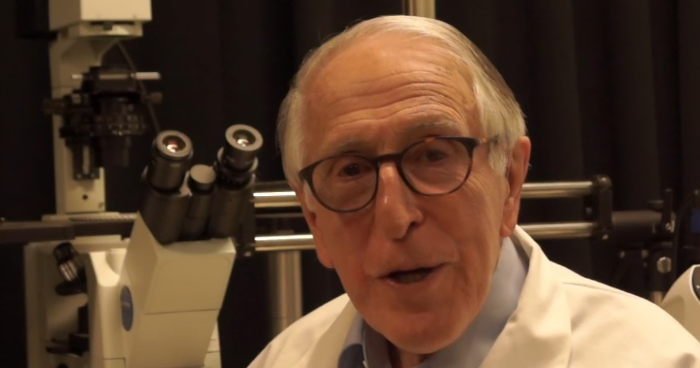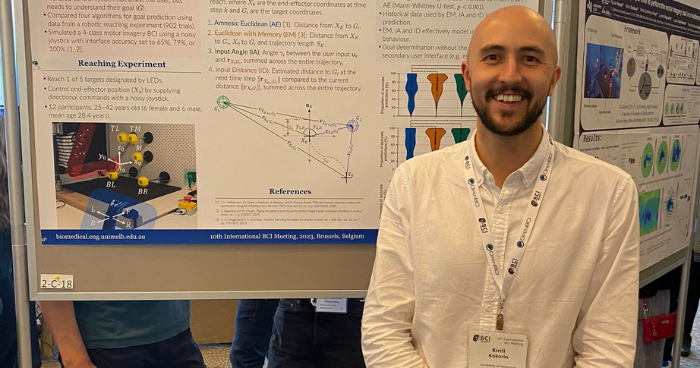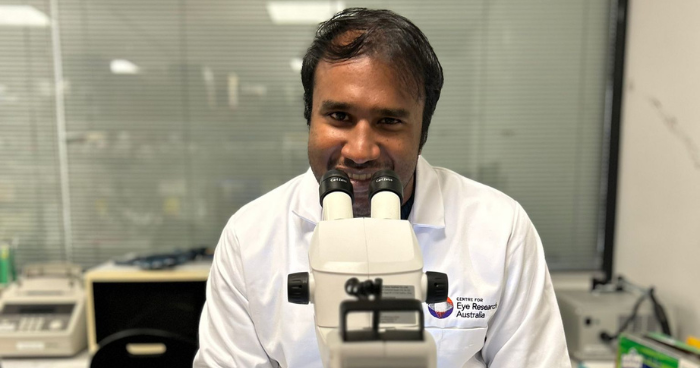Professor Graeme Clark donates own prize for pioneering research
University of Melbourne Emeritus Professor Graeme Clark AC has transformed the lives of thousands of people through the multi-channel cochlear implant (bionic ear).
Now, two PhD students are benefiting from Professor Clark’s passion for scientific discovery, with the hope that they too can one day improve the lives of people with incurable conditions through cutting-edge research.
Professor Clark has donated his 2023 Rehabilitation International Centenary Prize of $15,000 to top-up scholarships for Kirill Kokorin and Satheesh Kumar, who are working with world-leading experts in the Graeme Clark Institute for Biomedical Engineering (GCI) in the Faculty of Engineering and Information Technology (FEIT).
Kirill is seeking to improve brain computer interfaces (BCIs), which allow people with neurological and central nervous system illnesses to connect with a computer through their thoughts, so they can more easily communicate and interact with the world around them. Satheesh hopes to pioneer a gene editing treatment for Usher Syndrome, an incurable genetic disease that causes vision and hearing loss.

University of Melbourne Emeritus Professor Graeme Clark AC.
Professor Clark said he was delighted to support young innovators at the forefront of biomedical engineering.
"My prize was from Rehabilitation International, which has a long tradition of helping people with a variety of disabilities, and so does the Graeme Clark Foundation, through which the gift was presented to Kiril and Satheesh, who aspire to help people with serious illnesses," Professor Clark said.
GCI Director Professor David Nisbet thanked Professor Clark for his generous donation.
“Professor Clark’s support not only honours his remarkable legacy, but also allows us to advance research and innovation in health,” Professor Nisbet said.
“With his contribution, we are empowered to continue developing biomedical engineering breakthroughs that transform healthcare worldwide. Thank you, Graeme.”
The ‘brave new world’ of brain computer interfaces
Working with Professor David Grayden, Associate Professor Sam John and Dr Jing Mu from the Department of Biomedical Engineering, and Dr Peter Yoo from the company Synchron, which is commercialising an endovascular brain-computer interface (BCI), Kirill will seek to develop adaptable BCIs that will make it easier for people with paralysis to communicate via a computer, or interact with their environment using a robot.
Groundbreaking advances over the past decade have made these concepts achievable, but the technology needs development for wider clinical translation.

Graeme Clark Scholarship recipient Kirill Kokorin.
“For those who may experience disruption between movement intention and execution, such as people living with motor neurone disease, BCIs can provide a direct pathway from the brain to an external device, that a person can use to communicate and control their environment,” Kirill said.
Part of this research will be conducted through a 12-month internship with Synchron, with doctoral training provided by the ARC Training Centre in Cognitive Computing for Medical Technologies.
Revolutionary gene editing with CRISPR-Cas13
No treatment exists yet for the vision and hearing loss caused by Usher Syndrome, which is believed to affect over 400,000 people worldwide. Satheesh Kumar hopes to help reduce vision loss in affected people through a new type of precision gene therapy that may be able to correct genetic mutations causing the syndrome.
Working with Associate Professor Rick Liu (Centre for Eye Research Australia), Professor Bang Bui (Optometry) and Associate Professor Fred Chen and Dr Lewis Fry from The Royal Victorian Eye and Ear Hospital, Satheesh will explore two new bioengineering approaches using the CRISPR-Cas13e enzyme to attempt to correct mutations in prevalent Usher syndrome genes.

Graeme Clark Scholarship recipient Satheesh Kumar.
RNA editing involves the precise manipulation of RNA sequences within the human genetic code KS and has exciting potential to treat genetic diseases because of its targeted accuracy and reduced risk of side effects. Unlike earlier gene therapies, which use viruses to carry healthy genes into cells to compensate for a faulty or missing gene, a CRISPR-Cas13e RNA ‘base editor’ can ‘rewrite’ genetic information within an intact RNA molecule.
The two researchers hope to complete their projects within three-and-a-half years, which, if successful, would accelerate the clinical translation of these technologies.